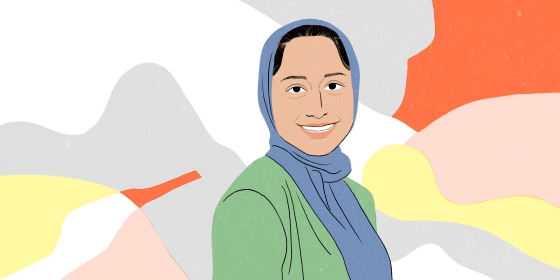When the coronavirus pandemic began spreading in the United States, Nidha Azam’s father had one request: Don’t go work at a hospital.
Azam, 31, is a physician assistant on Long Island, New York. She had been working at a family medicine practice, where she provided some care to patients showing COVID-19 symptoms, but when she saw the need for more health care workers in New York City hospitals, she knew she wanted to do more.
“I was like, 'Dad, all those A's, all those extracurriculars, all that test prep,'” Azam told NBC Asian America. “I was like, 'Ultimately, what did you think it was for? It's for this, Dad, so we can put ourselves in a position where we can do some real good in the world.'”
So this month, Azam left her job and joined Northwell Health hospitals in New York City.
Her days at Northshore University Hospital start by getting updates from the night team and catching up on the status of the patients in her care. A nurse might deliver the grim news that a patient has worsened or become unresponsive.
“I best describe it as being thrown into a war zone,” Azam said.
When she’s working with COVID-19 patients, she wears an N-95 mask and an eye shield. She dons extra personal protective equipment throughout the day, but she still worries that she might be risking her family’s health and her own.
“In the back of your mind you’re always wondering: ‘Was I too close? Do I now have COVID?’” Azam said.
At the family practice where she used to work, Azam would help refill medications, do routine physical check-ups and manage acute complaints. But when the coronavirus started spreading in New York, more of her patients began complaining about COVID-19-related symptoms. It was hard for her emotionally to hear them say they were having trouble breathing.
“Because you have so many patients, you think we just kind of become these robots,” Azam said. “And on some level, we are, just because we see so many of the same complaints. But something about this has been a very emotional experience, because these are dear, dear patients, and when they're sick, you can't leave that worry in the office."
Work doesn’t end when Azam’s shift is over. Friends and family call her about their own symptoms, and she offers reassurance and recommends where they can find appropriate care. She said that health care workers are always providing to those who need it.
“You can't just be like, 'No, I don't have time, I don't have time because my kids are being crazy,'” Azam said. “And that's not even a thought that comes to my mind. It's like: ‘So-and-so needs help. What can I do?’”
When she comes home to her husband and daughters, 2 and 4 years old, she is always concerned about potentially spreading the virus to them.
“The thought that you might accidentally bring your kids harm is a frightening thought,” Azam said. “And it's a paralyzing thought. When my kids had a cough here and there over the last couple weeks, I think I've stayed up and sometimes in tears because I'm like, ‘Did I do it?’”
But Azam pushes through because she knows the importance of her work and wants to be a good example for her daughters.
“I do this because I want to be able to tell them that whatever you do in life — and it doesn't matter what — make sure it is with purpose, make sure it is with intention,” Azam said. “Make sure that it is for something great.”
This story is part of our Asian Pacific American Heritage Month series, "AAPI Frontline," honoring essential workers who are serving their communities during the coronavirus pandemic. Read more here.
Follow NBC Asian America on Facebook, Twitter and Instagram.
